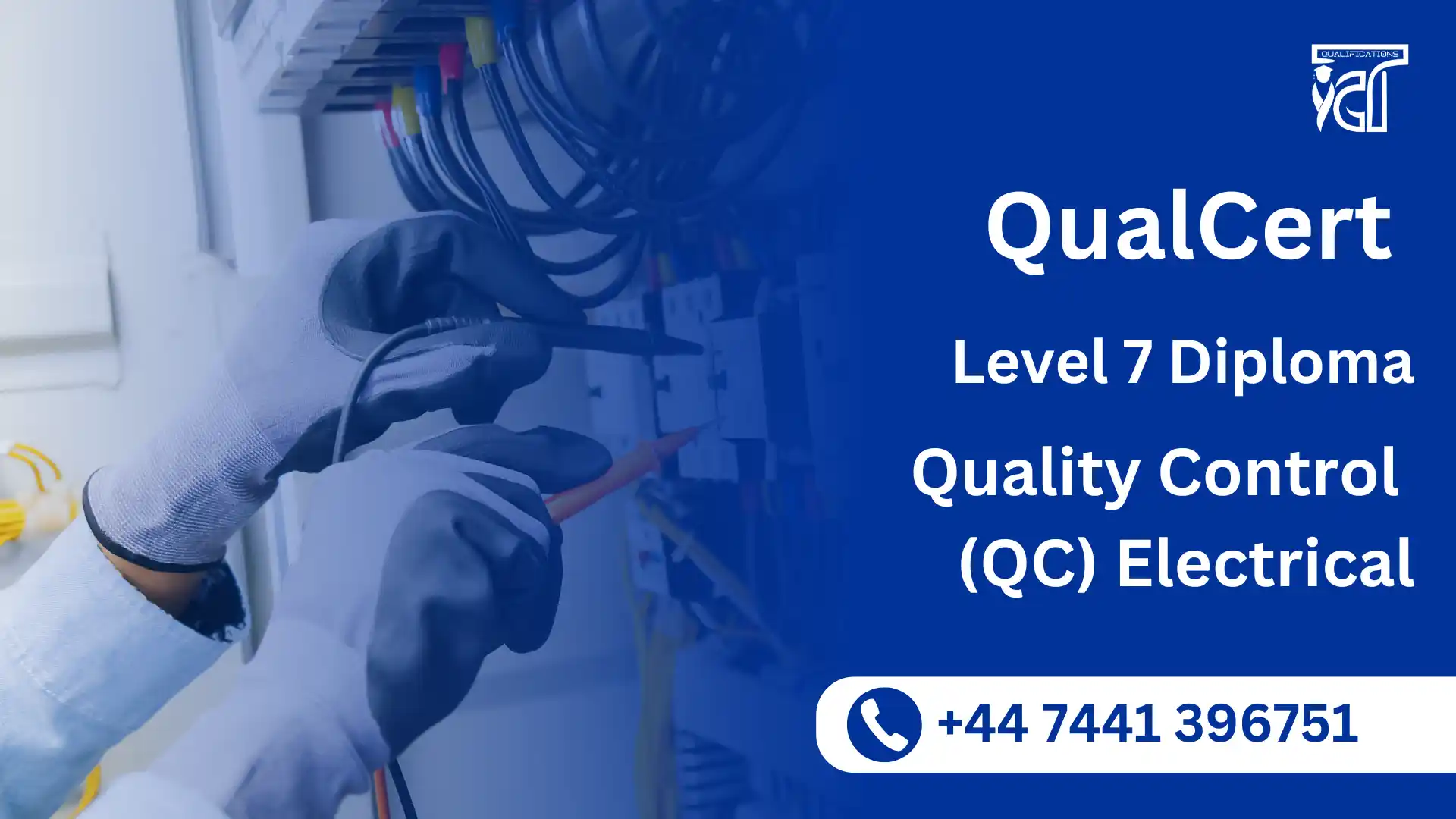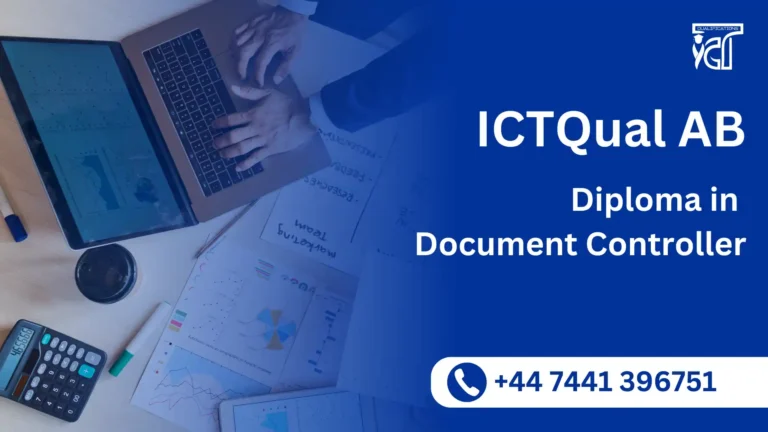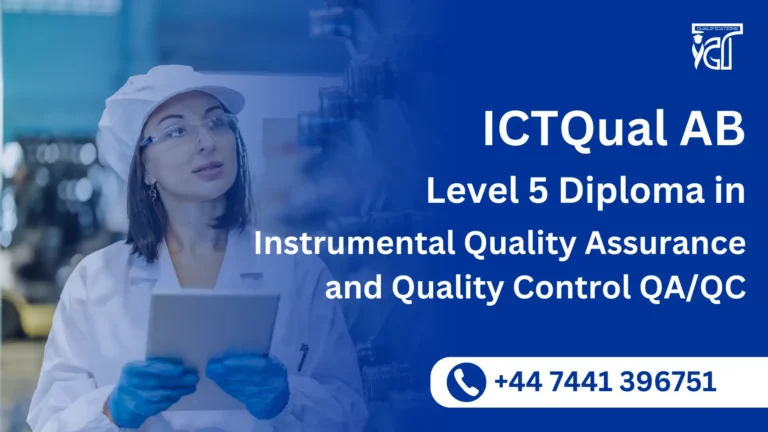The QualCert Level 7 Diploma in Quality Control (QC) – Electrical is a comprehensive and advanced-level qualification tailored for professionals aiming to master quality control practices within the electrical engineering sector. This diploma is designed to equip learners with in-depth knowledge of quality standards, inspection techniques, and regulatory compliance essential for high-level quality assurance roles in electrical projects.
Through a blend of theoretical principles and practical applications, the course focuses on ensuring electrical systems and components meet international safety and performance standards. Participants will gain the expertise needed to plan, manage, and audit quality control processes across various stages of electrical system design, installation, and maintenance.
Ideal for engineers, supervisors, inspectors, and quality managers, this diploma prepares individuals to take on leadership roles in quality control and to contribute to the delivery of reliable and compliant electrical systems in industrial, commercial, and infrastructure projects.
QualCert Level 7 Diploma in Quality Control (QC) Electrical
The QualCert Level 7 Diploma in Quality Control (QC) Electrical comprises several study units designed to provide learners with a comprehensive understanding of QC principles and practices in the electrical sector. Below is the qualification structure, including the Total Qualification Time (TQT) 1200, Guided Learning Hours (GLH) 600, and 120 Credits associated with the program.
| Unit Ref# | Unit Title | Credit | GLH | TQT |
| QC100013 – 1 | Strategic Management of Electrical | 20 | 100 | 200 |
| QC100013 – 2 | Global Standards and Compliance in Electrical Engineering | 20 | 100 | 200 |
| QC100013 – 3 | Advanced Quality Assurance Techniques | 20 | 100 | 200 |
| QC100013 – 4 | Risk Management in Electrical Projects | 20 | 100 | 200 |
| QC100013 – 5 | Electrical Systems Calibration and Management | 20 | 100 | 200 |
| QC100013 – 6 | Quality Control Project Leadership and Reporting | 20 | 100 | 200 |
GLH (Guided Learning Hours) and TQT (Total Qualification Time) are terms commonly used in vocational qualifications to help define the amount of time a learner is expected to spend on their studies.
1. GLH (Guided Learning Hours)
GLH refers to the number of hours a learner spends being directly taught, supervised, or supported during their course. This includes the time spent in activities such as:
- Classroom instruction
- Practical workshops
- One-on-one tutoring or mentoring sessions
- Online learning sessions with tutor support
In other words, GLH represents the time that learners are actively engaged with their instructors or learning activities.
2. TQT (Total Qualification Time)
TQT represents the total amount of time a learner is expected to invest in completing a qualification, including:
- GLH (Guided Learning Hours): Time spent on direct learning, as explained above.
- Self-Directed Learning: This includes time spent on independent study, research, assignment completion, preparation for exams, and any other work the learner does outside of direct teaching hours.
TQT is a broader measure that includes all the time required to achieve the qualification. It helps learners and employers understand the overall commitment required for the qualification.
Key Differences Between GLH and TQT:
- GLH focuses on direct learning with guidance or supervision.
- TQT includes GLH as well as independent study time and other learning-related activities.
Example:
If a qualification has a TQT of 600 hours and a GLH of 250 hours, it means the learner should spend 250 hours in direct learning (classroom, online, or tutor-led sessions) and 350 hours on independent study or research.
Strategic Management of Electrical Quality Control
- Build the capability to design and implement strategic quality control frameworks tailored to electrical engineering projects.
- Align quality control practices with broader organizational objectives to drive efficiency and consistency.
- Develop techniques for resource optimization in quality assurance across various electrical systems.
- Evaluate how strategic quality decisions influence the overall success and integrity of electrical projects.
Global Standards and Compliance in Electrical Engineering
- Explore key international standards and regulatory frameworks governing electrical quality control.
- Acquire skills to ensure compliance with industry norms and legal mandates.
- Learn to apply globally recognized best practices in electrical quality management.
- Understand the importance of compliance in mitigating risks and enhancing system reliability.
Advanced Quality Assurance Techniques
- Gain mastery of advanced QA methodologies specific to electrical engineering.
- Learn to utilize modern tools and technologies for effective quality testing and validation.
- Integrate advanced QA systems seamlessly into electrical project workflows.
- Conduct comprehensive audits and technical evaluations to uphold quality standards.
Risk Management in Electrical Projects
- Identify and evaluate potential risks associated with electrical engineering projects.
- Formulate proactive strategies to minimize disruptions and maintain timelines and budgets.
- Understand how quality control measures impact overall project risk.
- Design and implement risk management models specifically for electrical systems and infrastructure.
Electrical Systems Calibration and Management
- Learn the fundamentals and techniques involved in calibrating electrical instruments and systems.
- Apply industry best practices to ensure ongoing accuracy, safety, and operational efficiency.
- Develop systems for continuous monitoring and performance management of electrical setups.
- Establish structured calibration and testing plans to maintain long-term system reliability.
Quality Control Project Leadership and Reporting
- Strengthen leadership capabilities for directing quality control teams and initiatives.
- Manage large-scale electrical QA projects with a focus on performance, compliance, and stakeholder satisfaction.
- Produce clear, detailed quality reports to document inspection outcomes and improvement plans.
- Communicate quality findings, challenges, and achievements effectively to technical and non-technical stakeholders.
Advanced Expertise in Electrical Quality Control
Gain high-level knowledge and technical skills to lead quality control initiatives within complex electrical engineering environments.
Enhanced Career Opportunities
Open doors to senior roles such as Quality Assurance Manager, Electrical QC Engineer, Compliance Auditor, or Project Quality Lead in both local and international markets.
International Standards Proficiency
Develop a strong understanding of global electrical standards (such as IEC, IEEE, and ISO), making you a valuable asset in multinational projects.
Leadership and Strategic Thinking
Build the ability to lead QC teams, develop strategic quality plans, and align quality goals with organizational objectives.
Risk Management Capabilities
Learn to identify and manage project risks effectively, ensuring safe, timely, and budget-compliant electrical installations.
Hands-On Application of QA Tools
Acquire practical skills in using modern tools and techniques for quality testing, auditing, and system calibration.
Project-Based Learning Approach
Apply theoretical knowledge to real-world case studies and project scenarios, enhancing your problem-solving and analytical skills.
Improved Communication and Reporting Skills
Master the art of writing detailed quality reports and communicating technical findings clearly to stakeholders and team members.
Career Growth Across Industries
Qualify for roles in diverse sectors including power generation, industrial automation, construction, oil & gas, manufacturing, and infrastructure development.
Pathway to Further Qualifications
This diploma supports progression to advanced qualifications, such as a Level 8 Diploma, professional certifications, or specialized postgraduate studies.
The QualCert Level 7 Diploma in Quality Control (QC) – Electrical is specifically designed for experienced professionals and aspiring leaders in the electrical engineering and quality management sectors. The ideal candidate for this course includes:
- Experienced Electrical Engineers
Individuals with a solid background in electrical engineering who seek to specialize in quality control and enhance their credentials for senior roles. - Quality Assurance and Quality Control Professionals
Practitioners currently working in QA/QC roles who aim to deepen their expertise and advance their strategic and technical knowledge. - Project Managers and Site Supervisors
Professionals managing electrical projects who want to integrate robust quality assurance systems and risk management frameworks. - Compliance and Safety Officers
Individuals responsible for ensuring regulatory and safety compliance in electrical installations who require advanced knowledge of global standards. - Technical Auditors and Inspectors
Those involved in electrical audits or system inspections who wish to enhance their capabilities in quality evaluation and reporting. - Engineering Graduates and Technologists
Motivated learners with a strong technical foundation in electrical systems who are looking to specialize in high-level quality control practices. - Consultants and Trainers
Industry consultants and educators aiming to gain recognized qualifications and practical insights into advanced quality control systems.
Entry Requirements
Register Now
Qualification Process
Qualification Process for the QualCert Level 7 Diploma in Quality Control (QC) Electrical
- Self-Assessment:
Begin by evaluating your eligibility to ensure you meet the qualification requirements, including work experience, knowledge, and language proficiency. - Registration:
Complete your registration by submitting the required documents, including a scanned copy of a valid ID, and paying the registration fee. - Induction:
An assessor will conduct an induction to confirm your eligibility for the course and explain the evidence requirements. If you do not meet the criteria, your registration will be canceled, and the fee will be refunded. - Assignmnets & Evidence Submission:
Provide all assignmnets and the necessary evidence based on the assessment criteria outlined in the course. If you are unsure of the required evidence, consult with the assessor for guidance on the type and nature of evidence needed. - Feedback and Revision:
The assessor will review your submitted evidence and provide feedback. Evidence that meets the criteria will be marked as “Criteria Met,” while any gaps will be identified. You will be asked to revise and resubmit if needed. - Competence Evidence:
Submit final evidence demonstrating that all learning outcomes have been met. This evidence will be marked as “Criteria Met” by the assessor once it is satisfactory. - Internal Quality Assurance (IQA):
The Internal Quality Assurance Verifier (IQA) will review your evidence to ensure consistency, quality, and compliance with standards. - External Verification:
The IQA will submit your portfolio to QualCert External Quality Assurance Verifiers (EQA) for final confirmation. The EQA may contact you directly to verify the authenticity of your evidence. - Certification:
Upon successful completion of all checks, QualCert will issue your official certificate, confirming that you have attained the QualCert Level 7 Diploma in Quality Control (QC) Electrical.







